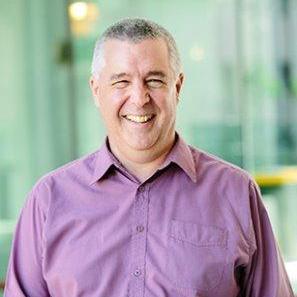Each month we shine the spotlight on a researcher within the Faculty of Health and Behavioural Sciences.

This month we caught up with Laurence Walsh, Professor of Dental Science at the UQ School of Dentistry.
What are your key research interests?
My research interests are around the interface of advanced technologies and biomaterials with clinical dental practice. This broad description includes several themes, including ways to prevent the most severe forms of dental caries (tooth decay) in children, improve conservative dental care such as endodontic (root canal) treatment or conservative dentistry, and make a dental clinic a safer place to work for dental staff.
My research work spans from working with nanomaterials and optical devices such as lasers in the laboratory, through to field studies and clinical trials. I also have been involved in the regulatory side of dentistry, which I feel is important in the research translation pathway as it opens the necessary doors to bring innovations to the clinical setting. I still love working in the lab, and particularly doing work involving any form of microscopy. To me, small is great!
Can you share some of your career highlights so far?
In my early career, I won an AMP Biomedical Research Award and several junior investigator awards from the International Association for Dental Research (IADR), which is the peak global body for dental research. Much later (in 1999) I was awarded the IADR Alan Docking Award, which is the highest award for senior investigators in dentistry.
After completing my PhD, I was fortunate to be invited to work as a post-doc in the medical school of the University of Pennsylvania (1989-90). This period of my life had a profound effect in shaping the rest of my career, after I returned to Australia. It also was of great benefit to my daughter, who was born while I was in the USA, and has since migrated back to her country of birth!
I have been fortunate to lead a wonderful team of researchers at the School of Dentistry at UQ. They are my second family, as it were.
In 2018, I was made an Officer of the Order of Australia, which was a major career highlight.
What aspects do you enjoy most about your career?
I love the blend and variety of activity and challenges that an academic career offers. Mixing specialist clinical practice and postgraduate training, with undergraduate education and a range of research projects provides me with variety and challenge. It is so stimulating to work with bright people, and a great joy to watch the careers of people in your research group develop and flourish over time.
Has your career taken you to any interesting, far-flung locations?
I have had the chance to visit 35 countries, and every continent except Antarctica (which I have only flown over, and am yet to make landfall on). Although not to everyone’s taste, I love visiting the factories around the world where dental equipment and materials are made, and going to any museums of science history that I can find, as these feed my interests in technology. Perhaps the most unusual location I have been to was to spend a day on a US aircraft carrier, hanging out with the pilots (reliving my early childhood dreams of being a pilot).
What inspired you to pursue a career as a researcher?
I got interested in dental research as a career when I was doing summer vacation research at the end of my fourth year of dentistry. That project laid the groundwork for what would later become research electives in my fifth year, and then my PhD work - so it was the tiny mustard seed that sprouted into a tree. I loved the way that the research lab team that I joined worked together. My PhD supervisor was a major inspiration for me, and I learnt much of what I know about good mentoring from him first hand.
What advice would you give students thinking about a research career?
Every person can make a difference, so don’t think that your own research can’t make a change in the world for the better. My undergraduate student research was the platform for what followed later, so the principle is that everybody has to start at zero and then work up from there. Find a good mentor and leader, and find out, by asking them, how their career was built – and learn lessons from that.
What was your first role after you graduated from university?
After my undergraduate program, I did university college tutoring, part-time clinical practice, and casual teaching while doing my PhD, before landing a part-time Tutorial Assistant job. Later I received an NHMRC dental postgraduate scholarship which, along with casual teaching and practice, got me through my PhD. After that, I went for a continuing academic position, then went overseas to do my postdoc work.
What are your interests outside of work?
I spend time with my wife, and my adult sons (who are still in Brisbane). I have several hobbies, of which building (and then using) flight simulators has been a consuming interest in recent years. It’s probably because I’m (still) a “frustrated flyer” and am attracted to any sort of complex technology. My wife believes it’s safer for me to fly and crash a simulator than the real thing, so I’m taking her advice on that matter.



